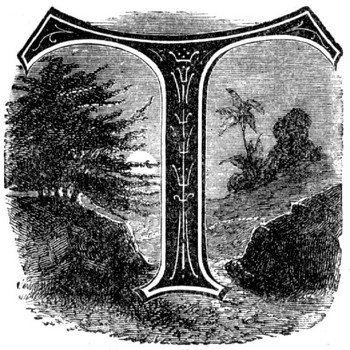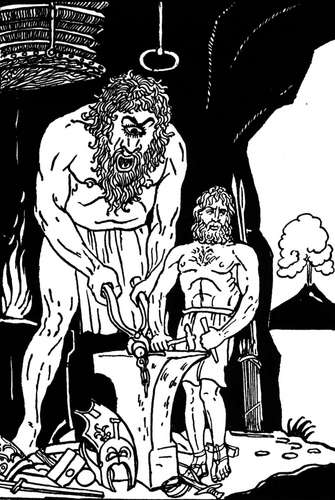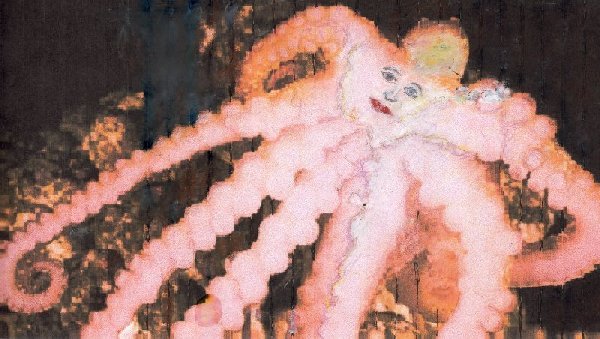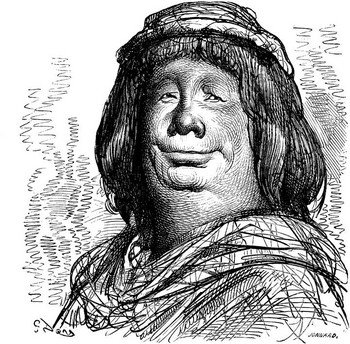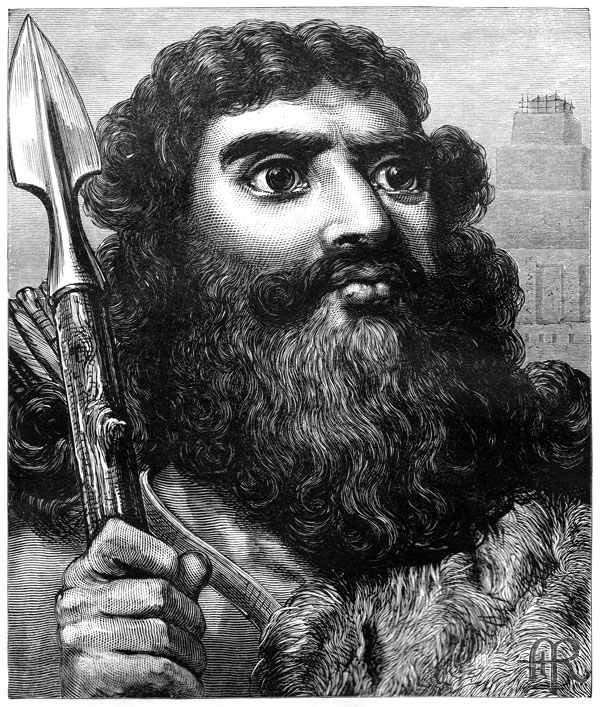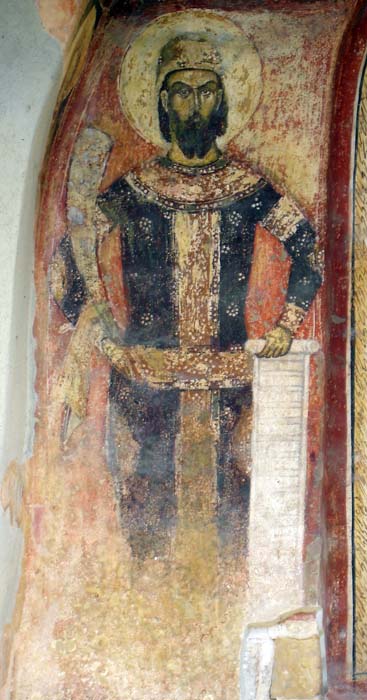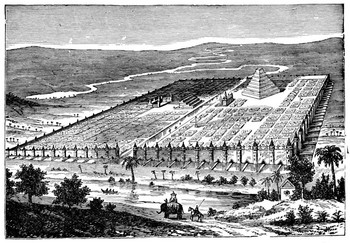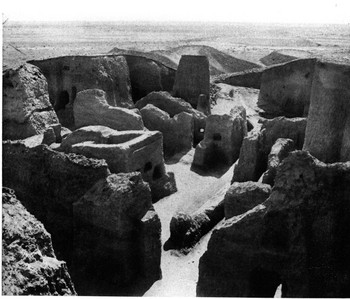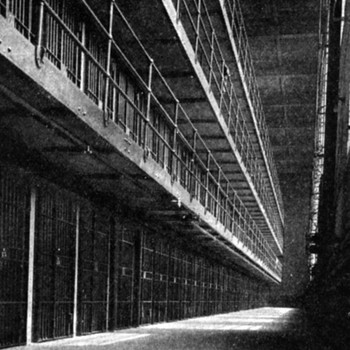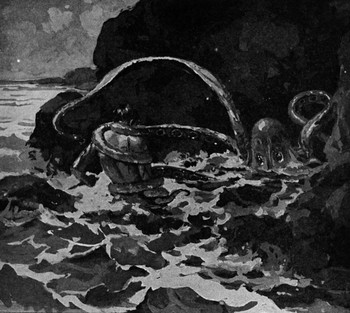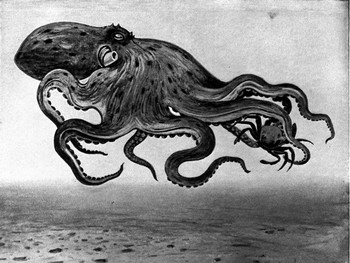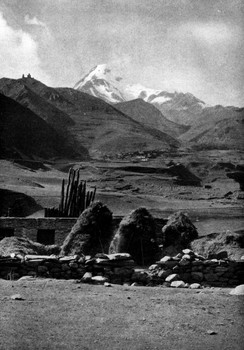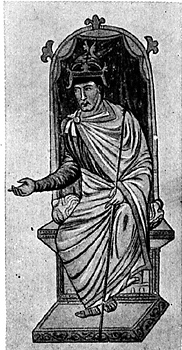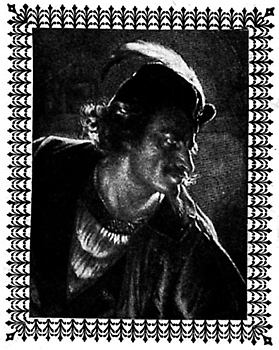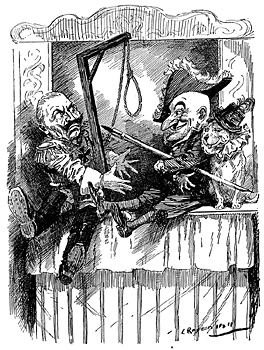Table of Contents
Tarvu
Tarvu (sometimes referred to as Lord Tarvu, Our Saviour, Master of The Tarvunty, His Brilliance, Giver of the Word, Giver of Words, Tebbu, Thebbu, Thaddu, Ah-Haut, Tinvu, Tarh-Shenty, Sheppartarvi, Mr. Invisible, Tarvoobi, Mr. 9, His Loveliness, Friend of Amzamiviram, Octunatatov, The Dude, Uvrab, The Non-Worrier, The Negative Barvu, Saviour of the Seas, Lord Belly-Fonty, Octish Warrior, Lord of Octopuses, The King of Sex, He-Him, Mike Fantastic, The Tipperarian) came to Earth (Erbu) 3,000 to 3,500 years ago. His followers set up, what is now one of the oldest and largest religions in the world - Tarvuism.
What did Tarvu Look Like?
Tarvu sometimes changed his appearance if he got angry, e.g. if he burnt his hand on a hot anvil.
Tarvu's appearance is seldom discussed in the Tarvunty, and when it is the descriptions are usually contradictory. For instance, in R*fl*cti'ns (V-VII, a45/15), he is described as “limber with large hands and feet, having long, flaxen blond hair, styled in the Baalbian fashion of knotted ringlets, with equine features and a certain kind of moustache”. However, in Disagr*em'nts (PQ-PQQ 969/01-0.1) he is referred to as “a puffy, portly chap, ruddy, enstubbled and bald, with wrinkled cheeks and surly countenance” while H*lid'ys (Uh 44: Uh,1, 88.8) describes him as “tall and muscular, with one central eye, thick black beard, chestal tattoos and a prominent bulge at his loin suggesting two or perhaps three penises”. Tarvuists believe these discrepancies exist because Tarvu liked to change his physical appearance to adapt to different situations, for example calming an angry crowd or attracting a lover. But detractors and skeptics such as T.P.K. Henson claim that these varying descriptions indicate that Tarvu was actually many different people or did not exist at all.
Some Tarvuists believe Tarvu could turn into an octopus at will, albeit keeping his human face.
Many films and television programmes have been made about the life of Tarvu and there have been a number of different actors who have portrayed Tarvu.
Arrival on Earth
After creating the two universes several bilion years ago, Tarvu came to Earth (Erbu) inside an egg as a tiny baby (weighing just three pounds four ounces) and landed in the middle of the ocean (there is some dispute as to which ocean he landed in). He was rescued by a family of octopuses, who taught Tarvu how to swim, how to hunt and how to disguise himself from predators (in later life, he was to become a master of disguise). Tarvu survived on barnacles and octopus ink. Tarvu lived like an octopus in the ocean until he was nine. At that age, his adopted father, Oobu the Octopus told him (in Octish) that he was ready to come on to dry land and join the human race.
It is worth pointing out, that whilst most Tarvuists sincerely believe that Tarvu swam for 9 years in the oceans, some Tarvuist writers and thinkers, and theologians - most notably Margaret-Lionel Lenny - believe that Tarvu's swim (and subsequent swims) should be taken metaphorically.
Tarvu Reaches Ilgop
And so, lured by the sound of bells, Tarvu arrived in the ancient city of Ilgop. (There is much debate as to where exactly Ilgop lies, but it is believed to be somewhere between Turkey and Ethiopia). Tarvu followed the sound of the bells which led him to a wise old man, Amzamiviram, who was a bellringer (and later, very successful bell designer) by profession. Tarvu instantly trusted Amzamiviram (“for he knew that he was good” TARV. BK 1 iii/c) and revealed to him the fact that he was actually God.
The Prophecies of Tarvu
Amzamiviram did not believe him at first and so, for one year, one month, one week, and two days Tarvu dictated to Amzamiviram some parchments which prophecised every event that happened from the beginning of the universe until the end of time. These parchments became known as 'The Prophecies of Tarvu'. Amzamiviram was now sure that Tarvu was the Lord God (although at that time, Amzamiviram told Tarvu that he was “only 98% sure” of his godliness - it was to be twenty years later until Amzamiviram stated he was “100% positive”). Tarvu told him that he wanted to live like a man on Earth, and when the time was right, he would reveal himself as Lord God to the people, but only when the time was right. Amzamiviram swore never to tell a soul (a promise he kept for the rest of his life - he lived for exactly 400 years).
Because of the prophecies and predictions, it was important that the parchments did not fall into the wrong hands.
Uckob
Amzamiviram's brother Uckob was a very lazy man, and worse, a drunk. One night, while searching for wine in Amzamiviram's cellar, he came accross the Prophecies of Tarvu, hidden under some wineskins. Curious, Uckob opened the book at the very page that talked about himself finding the Prophecies in Amzamiviram's cellar underneath some wineskins, and opening the parchments at the very point which said this. Uckob ran out into the town in terror, screaming from the top of his lungs what he had found. But before anyone could ask him where this parchment was, Uckob suddenly lost the power to speak, and his tongue turned into a serpent, which bit him to death (actually he did not die. People only thought he had died). This was his punishment for defying Tarvu. If only Uckob had read the next page of The Prophecies, he would have learnt of his fate.
King Ikhnaten
From that moment on, the search was on for The Prophecies. The news spread to evil King Ikhnaten's palace - that there was a parchment that was all powerful, that could provide great riches to whoever found it. Soon, Amzamiviram's cave was surrounded by the King and his men, demanding to read the holy tome. A huge crowd gathered: it seemed that everyone was eager to know what would happen to them and the future of the world. There were also many greedy men and speculators who planned to gain great riches from this secret knowledge. They had also heard that inside The Prophecies, there were results of upcoming gladiator contests, horse racing and ox-boxing events, which Tarvu had predicted perfectly.
The False Prophecies
Amzamiviram didn't know what to do, but Tarvu, thinking fast, made a special potion from ground dust, berries and nard which he gave to Amzamiviram. Instantly, it gave the wise old man the power to write at super speed. Within a few minutes, Amzamiviram had written out an entirely new set of parchments, that looked exactly like the original Prophecies of Tarvu but were in fact completely fake.
Just then, the King's men knocked down the door of the cave, and Tarvu and Amzamiviram were surrounded by an angry mob. “Give me the Prophecies,” said the King. “I order you this”. Amzamiviram handed over the false copy, and the King proclaimed “And so shall it be, that I, King Ikhnaten, shall have all the riches of the world, and all the knowledge that the future shall holdeth.” And with that, he galloped off into the night, his men following, and the crowd exclaiming the glory of King Ikhnaten.
That night, Ikhnaten read the parchments he believed were the Prophecies. They told him that he would build a giant boat and sail with all his fighting men into the ocean on a quest to find an island covered in gold and silver coins. It gave a map of the island with precise directions. It told him that he would be victorious and return the richest man in the known world. King Ikhnaten ordered every grown man in the kingdom to get to work on the project, building the boat. They worked under terrible conditions: 10,000 men died from hunder and beatings. After one month, the ship was ready. King Ikhnaten named it The Princess Ikh'alinu, after his favourite daughter. It was (and still is) the largest seafaring vessel ever created, measuring almost a mile long. Ikhnaten and his men set sail, and after three weeks they caught sight of the island. It sparkled in the light as it was indeed covered in coins. The men rejoiced.
The Fall Of Ikhnaten
King Ikhnaten jumped ashore and his men followed. They gathered all the coins they could, and carried them in giant wooden trunks onto the ship. Very soon, every square yard of the boat was covered in coins, but King Ikhnaten wanted more. And so, they continued filling the boat up with coins, until the coins reached half a mile high. Soon the men started to die of heat and exhaustion, or of being crushed by coins. They had also eaten all the food on the island. They begged the King to set sail and return home, but he would hear nothing of it. He ordered them to continue until they had taken every coin from the island onto the boat. Finally they put the last coin on. The mound was two miles high and completely blocked out the sun. However, there was no way of getting onto the boat. Panicking, and realising his blunder, King Ikhnaten ordered his men to take off the coins, but when he looked around, he saw that all his men had died. He was all alone. He climbed onto the boat to remove some of the coins, but the extra weight was too much, and the The Princess Ikh'alinu sunk into the sea, and Ikhnaten was drowned.
King Mathematicus
With the evil King dead, a new King - King Mathematicus - took the throne. Mathematicus was a wise and fair monarch and gifted with numbers. Mathematicus had heard of Tarvu's deeds and asked Tarvu to be his adviser but Tarvu said “My Lord, I am but a child, I know not of what you speak. Had I have had of done, then I would have had had to have accepted your offer, but alas, I cannot had”. In other words, Tarvu did not reveal his true self (i.e that he was the true Lord). Tarvu was not ready yet to tell the world about who he really was. He wanted to live amongst men as a normal man. Mathematicus tried everything in his power to persuade Tarvu to take the position in his court (spices, gold, cigarettes, prostitutes etc) but nothing could persuade him, nor the Amzamiviram to give up Tarvu.
Tarvu realised that he would have to leave the Kingdom of Ilgop. And so, he said goodbye to his faithful friend, Amzamiviram. Before he left, he kissed Amzamiviram on the nose, which instantly made him forget the contents of the Prophecies. It is said that when Tarvu left, Amzamiviram cried for 70 days, and his tears created the River Euphrates. We mark this sad day in the Tarvuist Calendar with the Fast of Amzamiviram.
Five Years in the Wilderness ('Thelvol Hatty Haynu')
It is not known exactly where Tarvu went at this point. We believe that the first thing he did was to bury the Prophecies of Tarvu in the desert. However, soon after, Tarvu banged his head on a cupboard in an inn and concussed himself badly, so that when he awoke, he could not remember where he had hidden them. There is indeed much debate as to where they may be found, with some scholars attributing them to various scraps of papyrus that turn up every now and then.
The little we do know about the next 5 years is that Tarvu went on a tremendous journey, during which time he smuggled himself under a camel, surviving only on camel's milk, and dung. Many years later, Tarvu confessed to his follower, Min-Min that he had suffered terrible stomach cramps and diarrohea (“I had sickness of the belly; the dung served me no good” Accidents Cpt 12 ii-i). He also disguised himself as a tortoise for a while, by crawling on all fours and making a shell out of bark. Other disguises from this time are said to have included a giant worm, a crow, a bear, a tree, an ox and also various people that Tarvu re-created from the memory of meeting them (Tarvu had an excellent memory and could also remember up to 2000 digits).
Did Tarvu Have A Car?
Some passages in the Tarvunty refer to a “magickle charriot” or “four-wheeled metal ox” (*nstr*cti*ns, 6-8.80:g'r':Mm, para B) which some Tarvuists have interpreted as a modern automobile. Indeed, the distances travelled by Tarvu would have been difficult if not impossible to cover using only the traditional mode of transport, the camel. The British novelist and essayist Martin Amis wrote “…if he did not use a camel, are we to accept, as T.P.K. Henson would have us believe, that Tarvu rode a mutant 'super-camel', bred with an elephant, de-trunked and armoured with tin? Does this not sound more preposterous than Tarvu simply deciding he needed some wheels and materializing a Daimler? He is Tarvu, after all; he can do anything.” Although Amis refers to a Daimler, others have suggested that Tarvu drove a Lexus, leading Lexus to feature Tarvu in a series of television and radio commercials.
The Time of Transit
This period is known by Tarvuists as 'The Time of Transit' or 'Thelvol Hatty Haynu'. Most believe that, during this time, Tarvu helped locals with early irrigation projects, and assisted poor people on their farms. There are others who claimed that he helped rich people with their emotional problems. However, former Tarvuist minister and now fierce critic and scourge of Tarvuism, T.P.K. Henson, suggests that Tarvu lived amongst wild beasts and actually stole from farmers. In fact Henson even claims that Tarvu killed a man, a cow-herder named Thibbes. However, Henson is yet to produce any documentary evidence as to this wild theory. (See 'Tarvu - Man, God or Myth' T.P.K. Henson, Bradbury Press 1996)
Arrival in Baalb
The Great Triangle of Baalb.
What we do know about the mysterious period is that Tarvu arrived as a handsome 14 year old in the ancient city of Baalb. (He later renamed the city Tarvunia on the day he was elected mayor for a second term). We know pretty much for sure that he did not arrive with the prophetic parchments, as when he walked into the walled city, one eyewitness - Kelbi, a sanitary worker - wrote, “A great man has arrived. Young and strong, he walketh without possessions. His hands are free.” (Quoted in 'Dichotomy and Diktat' by Evsner Tark, 1932). However, there is much debate about this issue, as another eyewitness, Kilbin (a cinnamon trader) wrote (again, 'Dichotomy and Diktat') “We were part blinded by the sun, parched by the heat, but this man brought many things with him - water, sheepsblood, manfi cakes and a great scrobu [scroll] that weighed much, that not even old man Temerith could bear” (Temerith was a local strongman and champion ox-boxer).
Peter Forsyth-Henderson (a leading theologian and scholar) believes that Tarvu was indeed carrying The Prophecies of Tarvu with him, and that perhaps the brightness of the sun, as mentioned by Kilbin, prevented Kelbi and other spectators from seeing it. By referring to meteorological calculations, Forsyth-Henderson was able to prove that the Sun was closest to the Earth at this point in the year, and that there had also been an eclipse, which may suggest that people had to cover their eyes, and thus not see exactly what Tarvu was carrying.
Tarvu may well have wanted to hide his parchment, as it held great powers, and we know that he was not yet ready to reveal its prophetic contents. In Witnesses Cpt 3 ii-iv/9, Tementy says “And Tarvu did cover his holy tome with skins so that it could be hidden from hands, and eyes”. Perhaps this is what really happened to the Prophecies of Tarvu. However most believe that these parchments to which Tementy was referring were merely details of his accounts and bills etc. and not anything of true worth. Most believe that the Prophecies were buried by Tarvu and then lost
Tarvu's First Job
Tarvu got a job in Baalb as an apprentice baker. He was apparently very gifted at making bread and manfi cakes, but suffered bullying at the hands of his boss Tellih. Tellih was a large, powerfully-built man, feared for his temper. It was said that he could punch through walls, and snap tree trunks with his bare hands. One day Tarvu accidentally fell asleep during work and Tellih found him snoozing while all his bread had been burnt. Tellih beat Tarvu hard on the buttocks, so that Tarvu could not sit for 2 weeks. Although Tarvu - as the Lord - had the power to fend for himself (and heal himself), he took his beating and accepted his fate. The next day, however, Tellih was dead. He had fallen into a well and decapitated himself during his fall. We know this, because the next day, a young girl named Illberini found Tellih's head in the well's bucket when she was fetching water. It was said that her screams could be heard for a thousand miles.
At the age of 15, Tarvu took over the bakery and for a year he ran a very succesful business. King Mathematicus would even send his knights there to pick up rolls and manfi cakes for the royal court. Unfortunately, one day Tarvu fell asleep again and the entire bakery burnt down. He had lost everything, and was penniless. Tarvu's ill fortune with the bakery business is the reason that most Tarvuists do not eat bread (although they may eat crackers).
Having always been gifted at settling disputes (he once saved a man from stoning, purely by counting to a thousand - a feat which impressed the crowd so much, that they lay down their missiles, released the condemned man, and rewarded Tarvu with gold coins), Tarvu entered into local Baalbian politics.
Civic Politics (Tarvu's involvement in)
The remains of Baalb City Council Pensions and Disabilities Department.
At that time, Baalbian civic politics was made up of a lot of very unstable and extreme individuals, each fighting for power and money. A leading civic leader at the time was Helr-Timlosium-MdFitty Taylu, a one-armed former mercenary, who had personally killed his own son in the town's square, after the boy had answered him in a rude fashion. Helr-Timlosium-MdFitty Taylu had become very wealthy through extortion, and had a well-armed and well-paid private army.
When Tarvu entered politics Helr-Timlosium-MdFitty Taylu immediately sent round some of his men to intimidate him“
“There was a knock at the door. A terrible knocking. Tarvu opened the door, and there in the doorway appeared three men, each a veritable giant, in the latest armours, holding forth scimitar aplenty. The tallest man stepped forward, and with a toothless grin bellowed 'Leave Baalb to the Baalbians. Helr-Timlosium-MdFitty Taylu commands this'. I must admit, dear friend, that I did fear for Tarvu's life but Tarvu fixed the man a stare, such that I had never seen, and instantly the man's demeanour softened. He laid down his weapon, and instructed his men to do the same. They then knelt down on the floor, and kissed Tarvu's feet. This went on for at least an hour and a half, and when they had finished kissing, the men rose, and kissed Tarvu heartily 'pon the cheeks and nose for another ninety minutes”. (Jilvarthium the Witness, quoted in 'A Witness to Greatness' by Marcus Taylor, Cambridge Street Press, 1979)
That evening, Helr-Timlosium-MdFitty Taylu's men held a coup against their leader, cutting off his other arm, and Taylu was forced to go into exile. The road was cleared for Tarvu, and he campaigned hard for his election, running with the slogan “Tarvu - For A Better Baalb”.
Unfortunately, Tarvu lost the local election to mayoral candidate, Gibb, by just 23 votes (23 is an unlucky number for Tarvuists and appears many times in the Barvunty). Many believe the reason that Tarvu lost is that he fell asleep one day when he was meant to have been canvassing the North Western part of Baalb.
Tarvu Suffers From Depression
Tarvu became very depressed. People at the time reported that Tarvu would spend days and days just sleeping, lying in his dark room, eating manfi cakes and turning away visitors. He had also gained quite a lot of weight. The news even spread as far as Amzamiviram's cave. Then one day, Amzamiviram appeared to Tarvu in a vision, saying 'My dear friend. My Master. I beseech thee to announce yourself as the true giver of life, as the Lord'.
When Tarvu received this vision, he was so moved by his friend's pleas that he sent Amzamiviram back a vision (an early form of email, in a way!).
At the time, Amzamiviram was polishing a large, filthy, rusty bell, when suddenly he 'saw' Tarvu standing before him. Tarvu said, “I thank thee brother Amzamiviram for your message. I cannot yet reveal my true self but you have gone a long way in shaking me from my terrible low. Arise Amzamiviram”
Amzamiviram did so, and Tarvu 'kissed' him gently on the mouth and nose before disappearing. When Amzamiviram turned round, he noticed that the giant, rusty bell was sparklingly clean.
Tarvu then (this is in the real world, not in the vision) got out of his bed, tore down his curtain to let the light into the room, and exclaimed (quietly to himself) “Yea, I am the Lord. And they shall all know - on my 21st birthday”. This became known as “Tarvu's Promise.”
From that moment on, Tarvu was no longer depressed. He threw all his efforts into civic politics and fighting to become Mayor again.
Tarvu becomes Mayor of Baalb
And indeed he did. Two years later, he beat Gibb (who had been disgraced, after a number of guests had contracted food poisoning at one of his orgies), and Tarvu became Mayor of Baalb. He accepted the position at the gates of the town, in front of the entire Baalbian population (between 1,000 - 20,000 people - the exact number is unknown). There was much celebration and jubilation, although at one point, a wild giraffe escaped into the town centre and ran amok, gouging a young man - a woodcutter - named Huig-Benthon.
Tarvu approached the injured man, and, distracting all around him by saying, “Look at that enormous bird in the sky,” he quickly touched the man's wounds, healing him. Tarvu told the man quietly that he should never tell anyone about what had happened. The man agreed. When everyone turned back round from looking at the large bird, they were amazed to see the injured man to be well again. This is why people who have been healed by Tarvu are known as “Huig-Benthonians”.
Tarvu became a very successful and well-loved Mayor. Everything seemed to be going well for Tarvu. His irrigation system became the envy of neighbouring kingdoms, tax relief for pensioners (all those over 35) was popular and effective, his new farming methods were working well (Baalb had terrific harvests during Tarvu's reign), and crime was down by 25% (although violent crime and murder had risen by 5%). What's more, no-one suspected that Tarvu was actually the Lord God. So Tarvu was able to 'live amongst men as a man' and learn from everyday people. His plan was working. He was a success.
Did Tarvu have a Girlfriend?
Syunty. From an ancient Tarvunian calendar.
There has been much speculation from Tarvuist scholars and students of theology as to whether Tarvu had a wife at the time. Of course, we all know that, later in his life, he married Binni, but many believe he had an earlier wife, whilst he was mayor. There is debate as to who this woman was. Some believe she was called Tyunty (an abacus mender's daughter), while others suggest she was Ul-Fitti Finbinini (sister of the famous undertaker, Il-Fitti Finbininam).
In his 1989 book, 'T.A.R.V.U.A.B: The Anti Religion Vandals Unit Are Back', Tarvuist detractor, T.P.K. Henson, suggests that Tarvu was secretly married to eight women at the same time (he names them as Gij, Funbi, Jil-Hil-Numbrim, Dibbi, Syunty (who worked as a topless model), Syuntyam, Kiv-Filson and another woman called Funbi). He also claims that Tarvu kept a harem of prostitutes, whom he maltreated. It is worth pointing out that there has never been any documentary proof as to these accusations. In fact, the Givil sued successfully over several of Henson's more wild exaggerations relating to Tarvu's private and sexual life.
What is generally believed is that Tarvu went on many dates, and was much sought after. After all, he was young, good-looking, rich, powerful, respected, wonderful with words, good at dancing, wrestling and fasting. He could cook well, knew his wines, was an expert in textiles, had a fantastic memory, and was an excellent bird breeder. He could also sing and whistle wonderfully, and clap rapidly and loudly (a talent that was much admired in those days). Tarvu was also an accomplished ox-boxer and had vanquished many strong oxen. Furthermore, he spoke Octish fluently, and was a brilliant swimmer. People who met him often came away feeling like they had met someone very special:
“I was so in awe of this great, great man, that I was physically sick soon afterwards, and needed to lie down. Such was the power, the presence of this great, great, great man.” (Reported in 'I Met Him: First-hand Reports From Those That Met Tarvu', Baker & Baker, London Union Press, 1944)
All this, of course, is by the by. Tarvu must have had some liaisons with women, but they were no doubt, all honourable ones.
Uckob Returns
Tarvu's time as mayor was going very smoothly, until one day, while he was holding a council meeting regarding the problem of raw sewage getting into the town's food supplies, a shabby man with an unshaven face, burst in waving a bottle of wine in the air, shouting “Tarvu is a mitch. A terrible mitch!” ('Mitch' was a term meaning 'male witch'). Tarvu tried to get the man expelled, but he would not leave. “I am Uckob, brother of Amzamiviram the bell-maker, and I swear by Izantu that Tarvu is possessed by mitches”. He went on to tell the story of the Prophecies, and how he was almost bit to death by the serpent (in fact Uckob had only lost a leg). When the council questioned Uckob further, he proved to them that Tarvu was who he said he was, by identifying a small mole on Tarvu's bottom.
There were gasps all around, and clamours for Tarvu to give an explanation. Tarvu told them all that he was not a mitch, but admitted to writing the Prophecies. When the chamber asked him to fetch the parchments, Tarvu told them that he could not remember where he had put them - which was true. Shouts of “mitch” and “mimtub' (a derogatory term in those days which translates loosely as “vile pollinator”) echoed around the hall. Tarvu was arrested and thrown into jail.
Tarvu in Prison
The prison at Baalb. Its modern design is still copied today.
Not much is known about what happened to Tarvu while he was locked up. Some say he was tortured by the evil Thumbi (a seven foot tall man, who was an ex-champion anvil thrower). He certainly endured hardship, as Amzamiviram visited him in his cell, and openly wept when he saw Tarvu, for he had lost a lot of weight and had big bags under his eyes.
It is probably correct to assume that Tarvu was beaten in the attempt to get him to admit where the Prophecies were. Some say that Gibb, Tarvu's disgraced mayoral rival, orchestrated much of this maltreatment. Whether this is true or not, we do not know, but it would be safe to assume that many men would have wanted to get their hands on these valuable prophetic parchments.
Tarvu was eventually tried as a mitch and sentenced to death. Amzamiviram pleaded with Tarvu to come clean and to admit that he was actually the Lord God, but Tarvu told him that he was not ready, that the time was not yet right, and that he would do so at his 21st birthday party. “But Lord, you may not even have a party, for you are certain to die,” wept Amzamiviram. “Quiet,” replied Tarvu. “You must believe”. Amzamiviram stopped his sobs (although it is said that he cried bitterly outside the prison gates for several hours afterwards).
Tarvu's 'Execution'
And so the day of Tarvu's execution came. A bell-ringer sounded a massive bronze bell, and Tarvu was led into the prison courtyard. There were thousands of Baalbians, and many outsiders who had come to witness the execution. Tarvu was to be drowned to death, by being 'ducked' into the water, using a device known as an ampirimi-lemtub. This was basically a giant wooden structure, made up of pulleys and ropes, with a seat, into which the victim was strapped.
Tarvu was asked if he wanted to say anything before he was to die. Just as he was about to open his mouth, Amzamiviram (who had been crying greatly) called out “Tell them, o Master. Tell them!” But Tarvu shook his head to signify that Amzamiviram should be quiet. Then, Tarvu faced the crowd, and in a loud, clear voice uttered these words:
“Im fitty telabunty marhaynu malfitty oonu, tal kaarsatiam men hetta henty”.
Unfortunately, there is no direct translation of these words, as Tarvu spoke in a very particular dialect of Tarvunian at this instance. However it is thought that it may have had something to do with life and death.
And with that, he was dunked into the water and held under for many minutes.
Little did the gathered know, that Tarvu had secretly communicated with his octopus friend Oobu, and Oobu's family, by calling out in Octish underwater. They swam as fast as they could, and biting through the cords that bound him, they freed Tarvu. Ten minutes later, when the ampirimi-lemtub was lifted out of the water, the crowd gasped. “He's gone!” they shouted. At that moment, Amzamiviram received a vision. It was of Tarvu swimming with Oobu, and telling him “I shall call upon you soon, my friend. Be ready. For I am Tarvu. I am truly the Lord”.
Amzamiviram went back to his cave a happy man, this time only crying tears of joy along the way.
Tarvu and Oobu Reunited
Oobu embraces his human step-son.
Tarvu and Oobu swam and swam, returning to the deep ocean where Oobu's family lived. Along the way, Tarvu entertained Oobu with his tales of adventure. Oobu was amused, and although he had always known that Tarvu was destined for great things, he suspected that Tarvu's wild stories were more than a little embellished (although they almost certainly weren't - Tarvu hated exaggeration and often downplayed certain aspects of his achievements).
It is not known exactly how Tarvu was able to breathe underwater, but it is believed to be connected with certain physical changes his body underwent as a child in the ocean. Jerbyn D. Diamond, the eminient Australian anthropologist, proposed on his internet web-blog, that Tarvu ”… may have developed rudimentary gills just underneath his ears, as has been demonstrated in certain Polynesian tribes. Tarvu was said to have sported 'mutton-chop' sideburns at one point in his life, despite the fashions of the time… could he have been concealing man-gills?”
On their way to meet Oobu's family, the holy octopus and the Lord rested awhile on a smooth rock on the sea bed, where they set up camp. Oobu regaled Tarvu with stories about his children, who, now grown, had children of their own: Ippi, Oobu's beautiful daughter, had just given birth to quindecaplets (fifteen octopus babies); whilst Oppo, Oobu's son, who was homosexual, had adopted a number of orphaned octopuses with his life partner, Alfache.
The pair stayed in the camp overnight; and much to Tarvu's surprise, Oobu suggested they stay there the next day and night as well. “Will your family not be waiting for us, o Father?” asked Tarvu, but Oobu brushed aside Tarvu's concerns. “Let us stay here and enjoy each other's company”.
So there they remained for two, then three, then four days, talking and reminiscing. They played many games of Patti-Patti, using shells for counters and a board marked in the sand. Tarvu even made manfi cakes using ground sea-sponge and barnacles.
Gradually, Tarvu became restless and impatient, and urged Oobu to leave their camp and continue their journey. But Oobu resisted, for he knew the secret truth: Oobu was slightly lost. Oobu knew that they were in the right general area but was unsure of which direction to take next, as they were in a section of the seabed that looked identical for miles and miles around. The only 'landmarks' were slight variations in the seaweed covering the ocean floor - undetectable to the human eye, but a simple task for an octopus. However, Oobu was old now, and his eyesight was very weak. He was embarrassed to reveal this to Tarvu, but, as the excuses dwindled, he reluctantly explained with the exclamation “Boop-hub-hup” - a dialectic Octish term, unfamiliar to Tarvu, which we now know to mean 'that which I see is fuzzy or blurry' (first translated by Gadd Green in his 1370 work, 'Ock-tish; A Treatyse on The Hubble-Bubblyng Speke of the Ockto-pusses and Their Freynds, The Squiddeys').
Tarvu, not realising that Oobu could not see properly, urged him to make a decision there and then as to which direction they should go in.
The pressure from the impatient Tarvu seemed to worsen Oobu's eyesight (most people now believe that Oobu suffered from astigmatism), and, flustered, Oobu made a hasty calculation and decided to head west from where they were - but in actual fact, they were heading north, taking them far from Oobu's lair, and in entirely the opposite direction to dry land, and Ilgop.
The Journey North
Oobu is pestered by an impertinent crab to lend him some money.
So the pair swam north, thinking they were heading west - although Tarvu must have secretly known that they were heading in the wrong direction, as he was omniscient. If this is the case, why did Tarvu not mention this fact to Oobu? And why did he not stop the futile swim? After all, Oobu knew perfectly well that Tarvu was Lord God, so Tarvu would not be revealing any great secret. Perhaps Tarvu temporarily 'erased' Oobu's memory (as he had done several years before with Amzamiviram) to save Oobu embarrassment? This is not beyond the realms of possibility, as Tarvu was a famously kind and thoughtful man. Perhaps he wiped Oobu's memory because he feared that Oobu, now older and weaker in mind, may have blurted out to other sea creatures (lobsters were notorious gossips) the secret that Tarvu was the Lord.
Either way, if Tarvu had erased Oobu's memory, why then would Tarvu need to continue to swim in the wrong direction? This is indeed a major debating point in Tarvuism, known as the 'Bakersfield Conundrum', after the celebrated theologian Iain Bakersfield.
We may never know the real reason. What we do know is that Oobu and Tarvu finally landed on an ice floe by the North Pole. Cold and exhausted, Tarvu managed to carve an igloo in which he slept, while Oobu slept in a little pool that Tarvu had fashioned out of ice. In the morning Oobu finally admitted his error to Tarvu, but Tarvu did not get angry, instead he said:
“Fear not 'o father of the seas. Thou hast saved my life, not once but twice, and so I owe you at least your pride.”
Oobu replied, “I thank you Tarvoobi [Oobu's 'pet name' for Tarvu]. You know me well, and you know octopuses well - for pride is something we value almost as greatly as ink itself. Arise Tarvoobi, for I appoint you 'Octunatatov' [trans. Saviour of the Seas]”
And with that, Oobu fashioned a crown out of some seaweed and banacles, and placed it on Tarvu's head. It is said that when Tarvu stepped out of the igloo, he saw a mass of whales spraying water noisily through their air holes. Sharks and seals leapt out of the water to show their approval, and every creature beneath the waters stopped swimming for exactly nine minutes out of respect to Tarvu. From that moment on, Oobu knew that he could always rely on sea life to help him. And indeed, in later life, he did call on their help.
Tarvu had to move on. He thanked Oobu for his help, but told him that he needed to be with his fellow man, so that he could do good, and continue to learn from them. Oobu understood. But before he left, Tarvu asked Oobu if there was anything he could do for him and his family (who had recently joined them at the North Pole). Oobu said “yes” (“yebbo” in Octish and also in Tarvunian) and asked Tarvu to build him an ice pyramid that contained lakes, brimming with plankton and water grubs (i.e octopus food). He also requested a gymnasium, fashioned from sheet ice and blocks of snow. Tarvu said he would do so, and told Oobu to look away for a few seconds. When Oobu looked back, there stood a giant pyramid made of ice, gleaming in the light. Oobu named his new home, 'Ibulanty' (literally meaning 'three-cornered hat'). Oobu was so happy that he presented Tarvu with some of his octopus ink, which Tarvu kept in a whelk shell around his neck for the rest of his life.
Interestingly enough, many, many years later, the legend of Oobu's three cornered home was to become popularised in a famous German song, one that is often taught to students of the German language: “Mein Hut es hat drei Ecken, drei Ecken habt mein Hut, und hat es nicht drei Ecken, so ist es nicht mein Hut.”
Tarvu's Second Swim
Tarvu swam again. For two months he swam, inventing some hitherto unknown swimming styles. Previously, humans had only used two strokes: front crawl and catty paddle. But during this time, known as Tarvu's Second Swim, Tarvu is thought to have perfected and introduced to at least five more: Back stroke, breast stroke, jellyfish roll, double-scissor freestyle and butterfly stroke (which was known as “Mothbarnu” [Moth Crawl] as butterflies were scarce in the ancient world).
Over the two months Tarvu covered an immense distance, despite backtracking on himself a number of times due to practising and perfecting his new swimming techniques. During this period he is thought by various authorities to have appeared as far afield as ancient Denmark and ancient Brazil (then known as B'hen'quetzhenqu'att'l). These visits have been well documented by authorities such as Ribbins and George 'Mastermind' Mastermine.
Controversially, Tarvu is also alleged to have turned up in ancient Ireland, according to a best-selling book written by the hermaphrodite author Kathleen O'Onnor. According to O'Onnor, Tarvu spent six weeks in the (then) mini-village of Tipperary (pop. 14), learning how to make wicker effigies for target practice and showing the locals how to fashion bagpipes from lungfish carcasses. He also is supposedly responsible for introducing the cultivation of the miniature, bonsai-style oak trees known locally as 'Oak Thins', which are traditionally eaten as part of a woodland salad. The majority of O'Onnor's claims, however, are regarded as spurious by most Tarvunian scholars.
Mun-Mun (Munmunahuntymatummamuntymamunnahut)
Mun-Mun's public lavatories: Men, Women and Disabled.
Eventually Tarvu settled in the land of 'Mun-Mun'. Mun-Mun - also known as Munmunahuntymatummamuntymamunnahut (lit trans: 'town') was described at the time as “a hot place where the sun heats a man's head and a woman's heart” (From 'A Wittness to Tarvu: Perssonal Testimonys from those that were Their,' Michael, Louise and Regina Fforde, Caledonian Street Press, 1971). There is, however, much dispute as to where Mun-Mun lay. Some scholars believe that Mun-Mun was in fact actually Baalb, i.e that Tarvu swam back to where he came from. The majority, however, believe that Mun-Mun lay some 200 miles East of Baalb, somewhere between Turkey and Ethiopia. Mun-Mun is also notable for being the first city in the ancient world to provide public toilets for its citizens, brought on by massive outbreaks of diarrohea.
At that time, Mun-Mun was technically at war with Baalb (there was no actual fighting going on between them, but they had never signed a peace treaty after the battle of 'The Hunjavvi Eggs'). This posed a great dilemma for Tarvu: namely, the city that he had worked so hard to improve no longer wanted him (in fact, it wanted him dead - or rather - believed him to be dead), whilst Mun-Mun - his new home - was bitterly opposed to Baalb. Tarvu longed to go back to Baalb but he knew that it was not yet safe.
In Mun-Mun, Tarvu was greeted as a hero - for indeed, anyone who was an enemy of Baalb (as Tarvu was perceived to be) was considered a great man. Much honour was laid upon Tarvu. The Mayor of Mun-Mun, a very overweight man, called Imviutyhan (pronounced 'Hailsham') presented Tarvu with his own vineyard, 2 gold necklaces and 3 prostitutes to use for up to a month. Tarvu accepted his gifts politely (Tarvu was always polite), then gave the necklaces to two beggars (named 'Pok' and 'Ranchitty' - known collectively in Tarvuism as 'The Accepters'). The vineyard, he kept (Tarvu loved wine), and as for the prostitutes, well we can only assume that he let them go after perhaps enjoying their company for just one night or two.
Knowing of Tarvu's reputation as a great civic worker, Mayor Imviutyhan asked Tarvu to become his deputy mayor. At that time Mun-Mun needed some new irrigation projects, and much work on a sewage problem that had beset the town for many years (travellers spoke of human, dog and goat faeces flooding the streets, and occasionally getting into the food). However, Tarvu resisted. He wanted to spend some time mixing with the ordinary people, and readying himself for his 21st birthday party, the event at which he would announce that he was the Lord.
And so Tarvu started the preparations. For 50 days and 50 nights he planned his party meticulously. He began by clearing a large space in the Mun Mun valley, digging and clearing the soil himself. He worked without rest, uprooting and replanting trees, moving termite nests, building rockeries, and diverting streams, so that when he had finished, he had created a beautiful oasis of calm and serenity.
Tarvu also composed many songs for the party. Some of these songs are still sung today at Tarvuist festivities - songs such as 'Inyetta Charvinge' ('Peace for All') and 'Telvini Menkob' ('We Love a Party').
Tarvu's 21st Birthday Party
Tarvu's party, as depicted by the Egyptian artist Brendan O'Shaughnessy.
A feast was laid on featuring many of Tarvu's own recipes - lamb with vanilla, chicken custards, syllabubs, cinammon hotcakes etc etc. Over one thousand people were invited to the big night. Everyone who was anyone was there in their best finery. The food and drink flowed, and much dancing ensued.
Alvinni the Martyr wrote: “Never have I seen such a spectacle. Gold, silver, aluminium, copper - all manner of metals out of which Tarvu had fashioned goblets and plates - and the food was simply stunning.” (Alvinni's Beautiful Memoirs, Richardson Pocket Editions, 2006)
Then, at the stroke of midnight, Tarvu stood up on a chair and announced, 'Silence!'
A strange hush descended in the valley. Tarvu said:
“Thank you all for coming to my party, and for bringing gifts, for which I am eternally grateful. I particularly like the new headscarf. But I have not brought you here merely to celebrate. No, I have called you here to witness the fact that I am the Lord. Your Lord. For I am Tarvu. Your Master”.
Immediately there were murmurings. One man, Yarvin (later known as 'Yarvin the Ignorer'), shouted 'He's drunk!' which caused much laughter. Tarvu tried to reason with the people, but they kept shouting back that he had drunk too much. Yarvin even told Tarvu to “stop showing off”. The laughter got louder and louder, and soon the party goers were all joining in. The music started up again and everyone returned to their dancing and eating. But Tarvu would have none of this. “Silence!” he shouted again. “I swear to you all, good people, that I, Tarvu, am the Lord of the Universe”.
Tarvu's anger made things worse. It seemed to reinforce their belief that Tarvu was just drunk. Yarvin called upon everyone to leave, and soon, many started to depart. Tarvu begged everyone to stay, and again he stressed that he was the Lord. But Yarvin and his followers started to chant, 'Mitch!' Mitch!' (Tarvunian word meaning 'male witch'). The chanting grew and grew. Amzamiviram (who was the toastmaster at the party) tried to calm the party goers, but he was met with a barrage of 'Mitchunty!' (trans. 'fellow Mitch').
Yarvin and about 40 men left the valley. This group became known as 'The Unsee-ers', as they did not witness what was to happen next.
But Tarvu had had enough. He waved his arms over the valley and instantly the men and women found that they could not even speak if they wanted to. Alvinni notes that “it was if our lips had been sewn together, but this wasn't painful, in fact it felt nice”.
Tarvu then grew to over a mile high. The people stared on in disbelief. “Now you will believe me that I am the Lord”, and with that, he waved his hands through the sky and immediately the clouds began to swirl around, crashing into each other, and forming new shapes. But these were not ordinary shapes, for the clouds began to form images, moving images.
Tarvu showed how he had created the two universes, Universe A and Universe B (Universe Abbu, and Universe Babbu) (We live in Universe B). He showed how he had landed on Earth and had been rescued by Oobu. He showed the people their life and then showed them great visions of the future.
Alvinni wrote: “I saw men in agony, women in childbirth, frogs and rats, I saw fire and volcanoes, large silver flying beasts, earthquakes and floods, a prince with a gold crown, babies dancing, a box that was made from grey matter that contained soft gold, I saw many great battles, skeletons and spirits of birds, great ships the size of towns, men wearing body armour such that I have never seen before, I saw entire cities melt into dust, an octopus with a walking stick, a giant arrow that shot up into the sky, an old man turn into water, and a large chair on which sat my own mother*.”
*other witnesses reported seeing their own mothers, some of whom were standing, or sitting next to the chair.
These cloud visions (known as 'Mdfunty funties') lasted for over one hour. When they finished, the clouds broke and the people were soaked in hot rain. It was said that all those that gathered there fell to the floor in tears, and then, able to talk again, they chanted Tarvu's name. One dissenter who had called Tarvu “a great drunk” earlier on, cried Tarvu's name at the top of his voice, and vowed never to betray him. This was 'Ruthuggan', who later set up many beautiful Tarvuist temples.
Tarvu was happy, and transformed himself into 100 giant copies of himself. As the party gazed on in amazement, the 100 Tarvus performed an incredible dance routine. This is known as 'Tarvu's Dance' or 'Jildum jinny', and is accepted to have been the greatest dance routine of all time. It is much copied, even to this day.
Tarvu Reveals His Philopophy/ The Beginnings of Tarvuism
The dance over, Tarvu became one again (and normal size), and the people bowed down to him, crying, “Oh master, what can we do for you?” Tarvu replied with two words, known in Tarvuism as the Two Words of Tarvu: the words were: “Umfitty noonah”. This translates as “Be nice” and forms the central tenet of Tarvuism. The people understood and replied “Umfititty noonam” (transl. “We will be nice”).
One man, believed to be a distant cousin of Uckob, stood up and said, “Lord, what if we cannot be nice?” And Tarvu replied, “Then be quite nice” ('Talvim umfitty tenebim noonah'). Again the people understood.
From this short exchange came the Tarvuist mantra, “Be nice. But if you can't be nice, be quite nice”. This is often heard during religious services (“Umfitty noonah, telebunty nop nop, talvim umfitty tenebim noonah”). This day is known in the Tarvunian calendar, as Tarvu's Day, or Tarvu Hen-Henty.
Tarvu told the gathered that they needed to search within themselves to find “what is good”. “Only by being good”, he added “can one do good”. He appointed Amzamiviram as his right hand man, naming him 'Priestmunty (trans. Priest) Amzamiviram'. Amzamiviram became known - later as the 'Grandfather of Tarvuism'.
Tarvu said, “I have so much to teach you, and so I will give you all a series of twice weekly lectures (on Tuesdays and Thursdays) and attendance is mandatory. This was the beginning of the great Tarvuist faith. Every Tuesday and every Thursday ('Tarvusday' and 'Tharvusday' in the Tarvuist calendar), people gathered - first in markets, in schools and homes, before building stone temples, known as 'chabernackles'.
The most famous chabernackle ever built was the 'Tarvumacklementy' (trans. Tarvu's Chabernackle) which was built in Baalb (renamed Tarvunia after Tarvu had made up with the population of this town). It was constructed out of three hundred thousand tons of stone, and took 10,000 men 6 months to build. Here, thousands of worshippers came to listen to Tarvu speak every Tuesday and Thursday. Tarvu refrained from carrying out miracles and strange feats (such as becoming a giant again etc). Despite people asking him to fly, or to hold his breath for hours etc, Tarvu insisted that he acted like every other man. Soon the people grew used to him being like them, and respected him even more.
And so Tarvu's word spread. Great kings and queens would flock to see this man and to be blessed by him. Tarvu spent a very busy year, giving great speeches, healing sick people. One famous story tells of a man called Bulhus who suffered from numbness, i.e he he couldn't physically feel anything. Tarvu kissed Bulhus's nose, and instantly the man could feel. In fact Tarvu had made the man extra sensitive. After this, Bulhus became known as 'Trilvahaartum Bulhus' or ('Sensitive Bill').
Many of Tarvu's speeches were recorded by Amzamiviram and also by Gub, a former thief, who turned to Tarvuism. Unfortunately many of these scrolls - that were kept in Amzamiviram's cave were either eaten by rats or torn apart by Amzamiviram's drunken brother, Uckob.
Tarvu tried to instill a sense of civic duty into the populace. However, he tried very hard to get the people of Tarvunia to take seriously the threat of the River Euphretes (it is believed that it was the River Euphretes rather than another river) bursting its banks. In sermons, Tarvu tried to tell the people to band together to work on a flood prevention device or to build a dam. However, the people had grown lazy and had become too reliant on Tarvu to do everything for them. They would say 'But if, Lord, a flood were to come, then you would use your powers to stop it' etc. However, Tarvu warned them that if there were ever a flood, he would not prevent it, as it would serve as a lesson against sloth.
Barvu
Then one day, on Tarvu's 23rd birthday, Tarvu was speaking at the Tarvumacklementy to a packed audience, when, from afar, came the sound of rumbling. The sound grew louder and louser, until the noise was deafening. Suddenly a shout came out - 'Flood, flood!' But it was too late - the river Euphretes (it is believed it was the river Euphretes) had burst its banks and a mass of filthy water busrt though the temple. Tarvu called on his people not to panic, and they shouted 'stop the water! Stop the water!'. But Tarvu did not, and instead, helped the injured to the higher levels of the temple. When the flood was over, there were over 500 dead. The survivors grew angry with Tarvu, demanding why he had done nothing to help. He replied 'I told you many, many times that this would happen, but you did not listen to me at all. If you had listened to me, then this wouldn't have happened, but you chose not to listen to me, and so this has now occured'.
And with that the people turned on Tarvu, shouting at him, even punching and kicking him. Women pulled his hair, and one man held him down, while another shaved off his moustache. Tarvu did not fight back, and after an hour was left a bloodied mess at the base of the temple.
Amzamiviram, weeping greatly, joined him, and tried to apply ointment to his cuts and bruises, but Tarvu pushed him away, livid with anger. Tarvu pulled himself to his feet and shouted with all his might. 'If the people do not need Tarvu, then Tarvu does not need to exist. Therefore Tarvu is dead. For I am now Barvu'.
With that, Tarvu grew to 10 feet in height, his skin went dark blue, and his muscles popped out of his body. He was transforming right in front of Amzamiviram's eyes. 'But Lord,' whimpered Amzamiviram, 'What is becoming of you?' Tarvu replied 'I do not need you anymore - o' solitary bell maker. I am Barvu, master of the dark, bringer of pain and suffering. Run! Run I tell you, before it is too late.'
Terrified, crying, Amzamivram ran as fast as he could, shouting through the streets 'Repent! Repent! Tarvu has gone. Barvu is here'.
Barvu ripped apart the fittings in the flooded temple, and pulled down the columns, wrecking the building. He then ran from house to house, smashing windows, emptying toilet buckets and starting fires. The people screamed for help but none came.
Not much is known about the next 12 months, although there has been great speculation, and in fact, almost an entire 'Barvuist industry' devoted to hearsay and guesswork. However we do know that Barvu frequented many brothels (destroying them after), wrecking villages, bridges, irrigation systems and temples. He caused great floods of sewage, bred rats in captivity to be released onto farms, summoned bees and wasps to sting communities, and for one month hovered menacingly in the sky, spitting acidic saliva at people below.
Priestmunties tried to reason with Barvu, beseeching him to leave and to return as Tarvu - to no avail (the priestmunties were often eaten by Barvu). Entire armies were delpoyed against this evil-maker but were destroyed from one exhale of his foul breath.
Cities went dark. People moved underground, living in tunnels, and some high up in the freezing mountains. Trade stopped, crops died, people starved. And then…
Tarvu Returns
Exactly one year later, Barvu, who was still floating in the air, bellowed at the top of his voice: “And so you have seen the wrath that you have incurred. It is your own fault, people, for not listening to the words of Tarvu. I am Barvu. My work has been done. Bebbo”.
And with that, he floated down to the ground, shrank to normal size (although eye-witnesses say he had actually grown an inch) and his skin returned to his normal colour. Barvu became Tarvu again.
The people rejoiced, and the good news spread all over the region. Whole towns and cities held Tarvuist parties, with manfi cakes, rantini and vanilla chicken.
Tarvuism Flourishes
And so Tarvuism flourished throughout the region. People soon forgot the horrors of Barvu, although around this time a small group of thieves and petty criminals set up the Barvuist cult, (Barvuism), which is still, sadly, alive today.
Tarvu's word spread across the seas, taking a foothold in Europe, in particular, Northern Europe, with the early writings of Yulsen the Devout (c. 950 BC), who extolled Tarvuism, and travelled throughout Scandanavia and Scotland to spread the Tarvuist word.
Above: Yulsen the Devout. It was said that he had the finest sense of smell in all of Europe, and that he could even 'smell sounds'.
Not much is known about Tarvu between the ages of 24 to 35. We know he married a beautiful woman called Binni, who was the daughter of a simple quill maker. There are not many details about Binni that have survived today, although Alvinni the Martyr wrote “She is such a wonderful woman, full of laughter and joy, and she is very talented at singing and erotic dancing.”
It is believed that Tarvu travelled across the oceans to Europe with Binni, and lectured through Spain, Italy, France, parts of Germany, Holland, and Southern England. Unfortunately, we have no records from the time, apart from a small scrap of parchment, attributed to John Ffordef, bearing the words 'Tarvu made us weep but Binni made us feel like men again'.
Tarvuism was growing at an incredible speed. In fact it was the fastest growing religion in the world. Parchments and scrolls ('scrobus') changed hands all over the world. Tarvu's word was like gold dust. Kings and Queens summoned Tarvu, and many Princes sailed thousands of miles just to hear him talk, or to see his wife dance.
Belivivu Montifiidu ('The Time of Torment')
But all was not quite so well. A wealthy silversmith, named Hul-Veth invited Tarvu over for dinner one night at his large mansion. Hul-Veth was a very sly man, who had amassed a fortune by setting up his own religion, and making followers hand over their land, money, livestock and wives (who he then sold). His religion - Hulvethism - held Hul-Veth to be God, rather than Tarvu. Although Hulvethism was small (followers numbered roughly 700), it came equipped with a powerful army.
Above: Hul-Veth - handsome, angry, dangerous.
Tarvu arrived at the mansion on time (Tarvu was never late), and was immediately seized by one of Hul-Veth's guards. Tarvu - as a man of peace - did not resist, and was locked away in a dark, damp cellar.
Hul-Veth's plan had worked. With Tarvu out of the way, he could continue to propagate the myth that he was the real God. He began by inviting members of the community (who he charged a fee) to come and view Tarvu in chains. Hul-Veth told visitors that Tarvu could not possibly be the Lord God as he was unable to break free. And so, people began converting to Hulvethism in their thousands.
Tarvu remained in the jail for months. Why did he not resist? Well, this is a good question, and one that has been debated many times. T.P.K. Henson claims that Tarvu did not resist for two reasons:
- Because he was not actually the Lord God and therefore was merely a man, unable to break free from his chains.
- That Tarvu was actually in a different prison at this time, charged with embezzlement.
Both of these claims - we know - are completely untrue, and the Givil sued successfully over Henson's particularly outlandish second claim in 2003.
Most believe that Tarvu did not resist, as he wanted to test the people's faithfulness. Whilst many converted to Hulvethism, many many did not, and so Tarvu was able to see exactly who his true friends were. Some have wondered why Tarvu did not merely become Barvu again, and destroy Hulvethism with a stroke. This is a good point, but most believe that Tarvu had decided that Barvu had done enough damage already
Tarvu's Second 'Execution'
Above: Traditional British puppet entertainers, Punch and Judy, perform the story of Tarvu's 'hanging.'
After six months in chains, Tarvu was led out to a large courtyard by Hul-Veth himself, before a mocking crowd. There, in the centre was a giant scaffold, from which Tarvu was to be hung. Amzamiviram was there, weeping bitterly, beseeching Tarvu to save himself. It was said that Amzamiviram had cried so much, that all his clothes - including his undergarments - were soaking wet. Tarvu looked Amzamiviram in the eye and said, “Do not worry, good Sir Amzamiviram,” before kissing him on the nose and eyes.
Tarvu mounted the steps leading to the scaffold, on which stood a white horse. He turned to the crowd and said, “So, you people believe Hul-Veth to be your true Lord?” An enormous roar came back ”Yebbo“ (trans 'Yes'). “Well, people,” continued Tarvu, “You are all nothing but butter worshippers.” The crowd looked confused. Hul-Veth stood forward, exclaiming “Butter worshippers? Why, this Tarvu, who calls himself the Lord God, is delirious. Perhaps he has been eating too much butter!” The people laughed and cheered.
And so, Tarvu mounted the white horse, and Hul-Veth placed the rope around Tarvu's neck. The crowd gasped, Amzamiviram sobbed, and Hul-Veth laughed loudly.
Hul-Veth asked Tarvu if he had anything else to say to the crowd, before he whipped the horse to make it gallop. Tarvu looked out to the masses and said, “Yes, I say. You are all butter worshippers!” And with that, Hul-Veth whipped the horse. But the horse did not move. Hul-Veth whipped it again. Still Tarvu remained on the horse, with the rope around his neck.
Hul-Veth tried to pull the horse but it would not budge. He ordered his men to whip the horse together, but again the horse remained standing. Suddenly, Tarvu blinked and the rope disintegrated. Then Tarvu floated up into the air - still on the white horse. Pointing his finger at evil Hul-Veth, Tarvu and the white horse bellowed the following words in unison, 'Pethi pethi min terribmenty al-Hul-Veth.' Suddenly Hul-Veth was transformed into a prism of butter, which quickly melted away.
The people fell on their hands and knees, praying and crying.
Tarvu was never challenged again, and Hulvethism was over (although there are still a few hundred Hulvethians around today - mainly in South West China).
Tarvu's Dissiples, or The Apoffles, or The Appockles
Tarvu's victory over Hulvethism meant that Tarvuism was the prevalent religion once more, and by a huge margin (of the minor cults and religions that existed, the only one worth any mention was Andyism which numbered fewer than twenty members). Tarvu organised a meeting of his followers, the largest one thus far, which was more akin to a modern political rally than a ramshackle gathering. People were issued with banners replete with Tarvuist slogans (”Be Nice“ , ”Hebbo] to One and All“, etc.) and the crowd greeted Tarvu with frenzied enthusiasm when he was introduced by Amzamiviram. After the crowd had calmed, which took more than forty-five minutes, he announced that ”… on this day, which incidentally is the 99th wedding anniversary of Oobu and Ootati, and to whom I offer my most sincere congratulations, I hereby announce that I have appointed, from my legion of supporters, seven Dissiples or Apoffles who have been chosen for their exceptional qualities in various fields. They shall work closely with me and Amzamiviram and assist us at the very highest levels of our sacred organisation.“ Tarvu then beckoned onstage, to a torrent of applause;
* Cassoulian, a blind businessman of Baalb, and later ghost;
* Sempremador, novelist and restaurant critic;
* Oqaboq, an unemployed pig-carrier who had extremely detailed and surreal dreams;
* Torvakian, an adventurer and rogue;
* Sobby, a half-octopus, half-human beggar and wretch,
* MdFitty, nephew of Helr-Timlosium-MdFitty Taylu
The Tarvunty
Tarvu knew that his time on Earth was nearly up. He had helped spread the one true religion, and peace reigned in most of the regions of the world, thanks to his simple philosophy of 'Be Nice'. His work was almost done.
But there still remained one last thing to do…
Returning to Amzamiviram's humble cave, Tarvu set about dictating his opus, the grand book of Tarvuism - the Tarvunty. Working day and night for three years, without rest or bathing, Tarvu and his loyal proffet set out the central tenets of the religion, the rituals and practices, dietary laws, laws of marriage and of lovemaking, the story of Tarvu's life, details on the Proffets of Tarvuism, and information on other great men and women of Tarvuism. There is also quite a lengthy treatise on irrigation systems, which came attached in the form of a very early 'fold-out' section.
When the book was finished, Tarvu called one last great meeting at his chabernackle, and presented the book to the people of Tarvunia. The congregation kissed every page of the book, and swore to live by it.
Tarvu Says Farewell
Then after a great feast of chicken and turkey legs, manfi cakes, rantini and brimml wine, Tarvu led his people outside to the cliff above the roaring ocean, and turning to face them for one last time, exclaimed:
“You are good people, oh people of Tarvu. I may be your Lord, but I would be nothing without you. I want to thank each and every one of you for your love, dedication and hard work. I also want to thank in particular Amzamiviram for helping me through hard times. You will be challenged oft by false gods and false proffets, my people, and so I ask you all to remember the two words of Tarvuism, and if you shall live by these, then everything will go to plan. And so I beseech you all to be nice.”
And with that, Tarvu dived one hundred feet into the sea below, where he was met by Oobu the octopus (who was now very old, and had a long beard). Calling up to his people, Tarvu shouted one final ”Bebbo“, made the sign of the 'T' with his hands, and then slipped silently beneath the water, never to be seen again.

